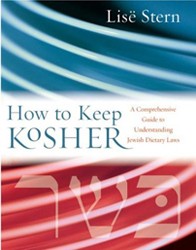Gil Marks — rabbi, chef, historian, lecturer, cookbook author — has long been recognized as a walking encyclopedia of Jewish food. Now Marks has compiled his vast knowledge into a comprehensive reference book enriched with recipes and anecdotes from his storehouse of Jewish food lore.
Adaptation, according to Marks, is the central feature of Jewish food. Living in almost every area of the world, Jews adapted the food of each community to the requirements of their dietary laws, rituals, holidays, and economic situation. When persecuted and forced to move on, they brought with them the food of their former homes, soon adapted to their new homes. In this way Jews developed many distinctive cuisines, reflecting the communities in which they lived and passed to the next generations as part of their legacy.
Given this broad definition of Jewish food, the encyclopedia embraces food from almost every corner of the world, starting with Adafina, the Sephardic Sabbath stew that originated in Spain and, in many variations, spread across North Africa, to Zwetschgenkuchen, a Central European combination plum cake and tart. In addition to foods and dishes, the more than 650 entries cover Jewish holidays, customs, and rituals, underlining the important role food plays in Jewish cultural and religious life.
A valuable reference for the origin, history, and significance of hundreds of Jewish dishes and for the preservation of the food of fading or lost communities, Encyclopedia of Jewish Food goes beyond the confines of the standard encyclopedia with its wealth of anecdotal and incidental information — Lauren Bacall, it turns out, is a first cousin of Shimon Peres. Highly readable, detailed, and informative, Encyclopedia of Jewish Food will reward any reader interested in Jewish cultural and culinary continuity. Illustrations, index, resource list.
Recipe: Sephardic Spinach Patties (Keftes de Espinaca)
About 16 patties
Ingredients
3 tablespoons olive or vegetable oil
1 large onion, chopped
2 to 4 cloves garlic, minced (optional)
2 pounds (about 16 cups raw) fresh spinach, cooked, chopped, and squeezed, or frozen chopped spinach, thawed and squeezed (about 4 cups)
About 1 cup matza cake meal or fine bread crumbs
About 3⁄4 teaspoon table salt or 11⁄2 teaspoons kosher salt
Ground black pepper to taste
1⁄4 teaspoon grated nutmeg or 1⁄2 teaspoon cayenne (optional)
3 large eggs, lightly beaten
Vegetable oil for frying
Lemon wedges
1. In a large skillet, heat the 3 tablespoons oil over medium heat. Add the onion and, if using, garlic and sauté until soft and translucent, 5 to 10 minutes. Remove from the heat and add the spinach, matza meal, salt, pepper, and, if using, nutmeg. Stir in the eggs. If the mixture is too loose, add a little more matza meal. Shape about 1⁄3 cup of the spinach mixture into 21⁄2‑inch-long, 1‑inch-wide, and 1⁄2‑inch thick patties.
2. In a large skillet, heat about 1⁄4 inch oil over medium heat. In batches, fry the patties, turning, until golden brown on both sides, about 3 minutes per side. Drain on paper towels. Serve warm accompanied with lemon wedges.
3. To reheat the spinach patties, place in a large skillet, add 11⁄2 cups vegetable stock, and simmer over low heat for about 5 minutes.
Variations
Italian Spinach Patties (Polpettine di Spinaci): Add 3⁄4 cup raisins soaked in white wine for 30 minutes, then drained, and 1 cup toasted pine nuts. Sephardic Spinach Patties with Cheese (Keftes de Espinaca kon Queso): Add 4 ounces (1 cup) grated Muenster, Swiss, Gouda, or Cheddar cheese or 1⁄4 cup grated Parmesan cheese.
Sephardic Spinach Patties with Walnuts (Keftes de Espinaca kon Muez): Substitute 1⁄2 to 1 cup finely chopped walnuts for the matza meal.
Reprinted with permission from Encyclopedia of Jewish Food by Gil Marks, Wiley 2010.
Maron L. Waxman, retired editorial director, special projects, at the American Museum of Natural History, was also an editorial director at HarperCollins and Book-of-the-Month Club.





